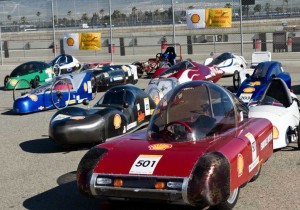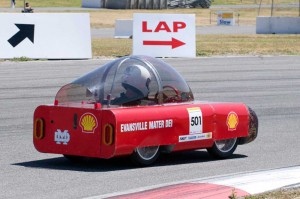
From NY to LA on a gallon of gas? That's the equivalent of what one student team achieved in the 2009 EcoMarathon.
Imagine making the drive from New York to Los Angeles on a gallon of gas. You’d probably burn through more Red Bull by the time you hit the Rockies. But a team of students achieved the equivalent of just that high-mileage performance as part of the Shell Eco-Marathon Americas, a track event that focused on miles per gallon, rather than miles per hour.
A team of student designers and engineers from Quebec’s Laval University pulled off the seemingly impossible, logging a full 2,757.1 miles per gallon with their a vehicle they dubbed NTF 3.0. Surprisingly, that’s not an all-time record. In 2008, a high school team from Evansville, Indiana, actually clocked 2,843 mpg.
“We knew coming into the challenge this year that we would have a lot to go up against,” said David Vallée, of Laval University. “But we had confidence in our vehicle and all the hard work that had gone into building it over the past year. We’re just excited the long hours paid off and we were able to win the 2009 Shell Eco-marathon Americas.”
A total of 44 high school and college teams participated in this year’s Eco-Marathon, which was held in Houston. Entrants came from the U.S., Canada, Mexico, Brazil and even India.
Participants could field vehicles in either of two categories: UrbanConcept entries had to be reasonably roadworthy, and aimed at meeting real-world needs, while Prototype entries could stretch the boundaries of motor vehicle designs. Teams could use any and every possible source of energy, from conventional gas or diesel to biomass, hydrogen and even solar power.
Laval’s combustion engine-powered NTF3.0 captured the Grand Prize – and $5,000 in cash – in the Prototype category. Using a complex calculation, a team from Purdue University actually achieved the equivalent of 4,913 mpg on solar power, with their sun-fueled Solar prototype. And Penn State University got the equivalent of 1,912.9 mpg using hydrogen in their Blood, Sweat & Gears.

Mater Dei High School, from Evansville, Indiana, turned out 433.2 mpg from their Street Buggy. Last year's Mater Dei team achieved the seemingly impossible 2,843 mpg.
In the UrbanConcept category, Mater Dei High School, of Evansville, Indiana, returned as victors with their Street Buggy, turning out 433.2 mpg. The Mater Dei Supermileage Team set last year’s 2,843 mpg record.
“The Shell Eco-marathon is a platform for students to let their imaginations run wild,” said Mark Singer, global project manager for the Shell Eco-marathon. “By encouraging these students to build vehicles with greater energy efficiency, we hope this will help inspire others; and together we can find solutions that will help meet the global energy challenge.”
Matching 2,700-some miles per gallon is certainly a stretch. Indeed, the auto industry is expected to spend tens of billions of dollars just meeting revised federal fuel economy standards in the mid-30 mpg range. But the results of the EcoMarathon suggest that significant future improvements in fuel economy are possible.

I say good job folks, our future is counting on you. Congratulations and Thank you